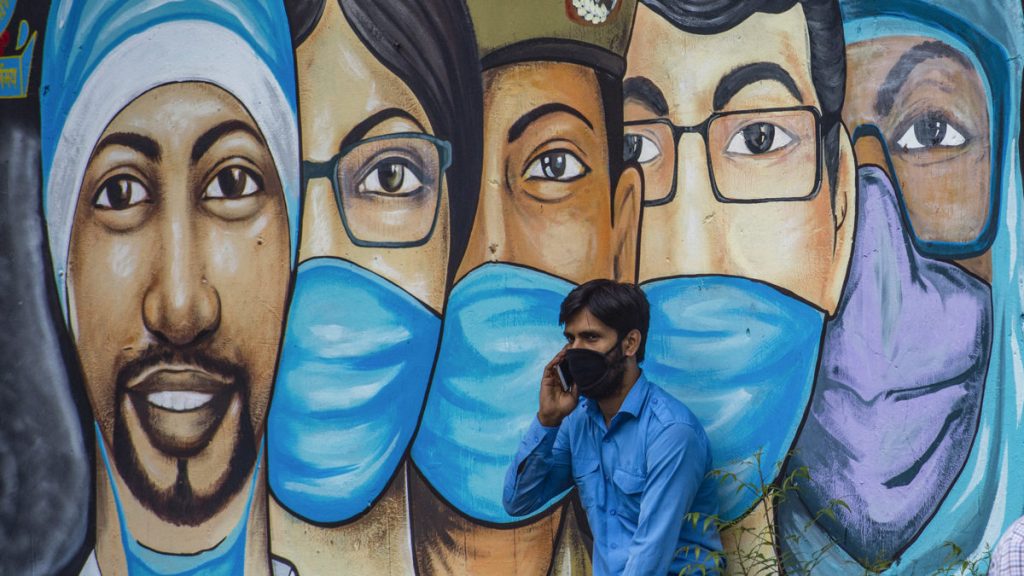CHENNAI, India — While India was dealing with mass destruction amid the deadly second wave of Covid-19, an Indian non-profit organization filed a petition in the country’s financial center, Mumbai, against Amazon Retail India over the sale of fake medical-grade face masks.
Friends of Wadala East’s Public Interest Litigation (PIL) in the Bombay High Court was also against the Union Ministry of Health & Family Welfare and the Union Ministry of Consumer Affairs for failing to check the sale of fake masks.
The NGO had placed a bulk order of 400 masks for healthcare workers on Amazon in May. But the products were “shoddy and substandard in quality, were poorly packaged and nowhere close to what they were described as on the portal”, the PIL states.
The organization could not distribute the masks.
“The PIL primarily focuses on medical-grade masks, not fancy masks,” Sujit Lahoti, advocate and proprietor at Sujit Lahoti & Associates, told Zenger News.

Lahoti is representing the NGO in this case.
“The litigants also placed an order for medical-grade masks on other websites. Someone is selling an N95 mask that is actually a cloth mask; someone is selling a W95 super mask — all these are deceptively similar.”
“So, a false sense of confidence is generated. The majority of products we found online had no system of checks before they go on sale. If you are selling a medical-grade face mask, please ensure the certification, the lab reports are in place before being listed on your website,” Lahoti said.
As India grapples with the pandemic, its mask market saw a boost in sales. The boom in demand for masks has seen e-commerce marketplaces being flooded with vendors who claim to sell medical-grade and certified masks.
India’s surgical mask market was valued at $71.73 million in 2019 and is expected to reach $157.13 million by 2027. Several e-retailers like Amazon, Flipkart, and Snapdeal sell medical and non-medical grade masks.
The high court has issued a notice to the Union government, seeking its response, and the case is scheduled to be heard on June 17.
Amazon, Flipkart, and Snapdeal did not respond to request for comments from Zenger News.
The NGO wants these companies to ensure the certification of masks is in place before a customer places an order to avoid the sale of fake masks that give a “false sense of protection” against the Covid-19 virus.
When the NGO reached out to The Mask Lab, the manufacturer of the 400 masks as listed on Amazon’s site, the company said it was not their product and that many fakes are being sold in their name.
“We have been using our brand since April last year and applied for a trademark way back in September,” Apurva Gargava, head of marketing and e-commerce, The Mask Lab, told Zenger News.
“But because of the pandemic, our trademark application has not come up for hearing yet.”
Amazon’s policy only gives the original brand and manufacturer protection for their product if they have a registered trademark, according to Gargava.
“It’s a terrible situation that customers who order from fake sellers end up with a mask that’s not certified or approved as a medical-grade product. We tried to appeal to the fake sellers and have even taken legal efforts from our end to try and prevent fake sellers duping innocent customers,” Gargava said.

The NGO’s PIL points out the difference between regulatory compliance on Amazon U.S. and India.
Amazon U.S. requires sellers to have a Food and Drug Administration (FDA)-approved certification from the mask manufacturer to list it on the site.
Amazon U.S. also has a detailed compliance checklist for medical devices, and sellers are prohibited from listing products that claim to be FDA-approved.
Gargava said the firm has certifications in place to manufacture medical-grade masks.
“We have received the IS:9473 certification from the Bureau of Indian Standards for our FFP2 masks and the IS:16289 license for our surgical masks. Once we get certified each year, we receive surprise audits throughout the year from certifying bodies. We also conduct external testing at independent labs to ensure all products meet quality standards,” she said.
The IS:9473 certification is for respiratory protective devices, and FFP2, which stands for ‘filtering face piece’ and N95, are similar respiratory masks.
“Respiratory masks are designed to protect healthcare workers who provide care to Covid-19 patients in settings and areas where aerosol-generating procedures are undertaken,” the World Health Organization said.

The PIL asks both the Union ministries to adhere to the Consumer Protection Act, 2019, and Consumer Protection (e-commerce) rules, 2020, to ensure e-commerce platforms transparently disclose, advertise, and categorize medical-grade face masks.
For instance, the sale of N95 masks with valves is continuing on e-commerce sites despite advice to the contrary from scientists and government officials, the PIL states.
“You already have a Consumer Protection Act 2019 and Consumer Protection e-commerce rules, 2020. There’s been a breach of this, and there is misrepresentation happening. When I studied the invoice [for the masks], its description mentioned that The Mask Lab manufactured it. But the masks were not manufactured by The Mask Lab but were sold by one Shaivas Enterprises. It’s a classic case of misrepresentation,” Lahoti said.
“In case of issues with the masks, you can approach the consumer court. But the idea is to prevent it at a pre-purchase stage rather than a post-purchase stage. The laws are there; the bureaucracy has the teeth. The problem lies in the inaction.”
(Edited by Amrita Das and Gaurab Dasgupta)
The post Non-profit Takes Amazon India To Court Over Fake Medical-grade Masks appeared first on Zenger News.


